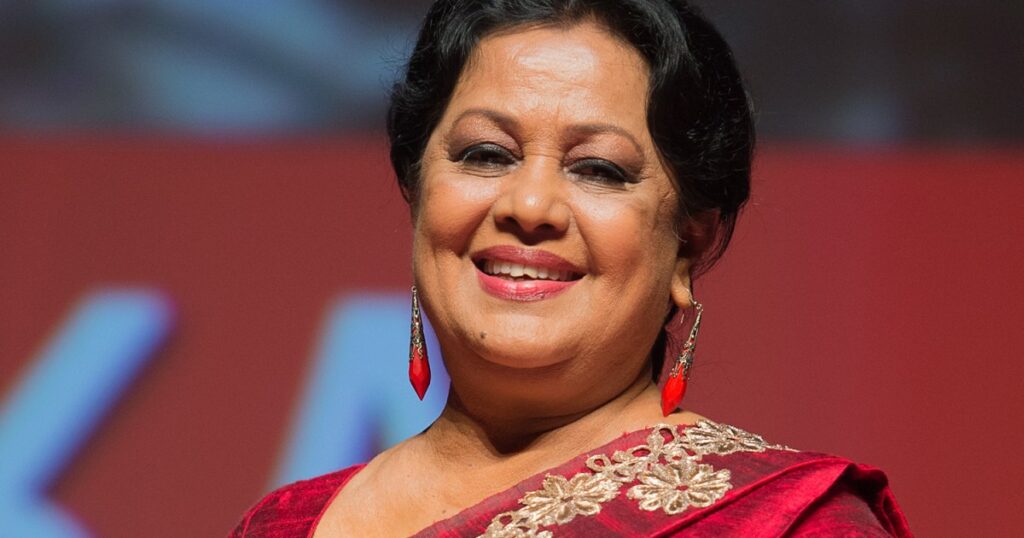Colombo, Sri Lanka — As a girl, when Srimathi Mallika Kaluarachchi would go to the cinema with her family, and a man on the screen would hit the character played by superstar Malini Fonseka, Kaluarachchi would cry.
Then she would turn to her father in desperation. “We used to scream at the screen, telling our father to save her,” Kaluarachchi, now 68, recalled. “That was how much we loved her.”
On Monday, Kaluarachchi joined thousands of fans in bidding a final goodbye to Fonseka, who died on May 24 at the age of 78 while receiving treatment in hospital. Neither Fonseka’s family nor the hospital has publicly revealed the nature of her illness. One of the country’s most popular actresses, Fonseka was widely regarded as the queen of Sri Lankan cinema.
She was cremated with full state honours, as fans dressed in the mourning colour of white flocked to Colombo’s Independence Square to catch a glimpse of her coffin before she was cremated. Songs from Fonseka’s films were played while a projector drone flew above the crowd, displaying a montage of scenes from across her career.
Describing Fonseka as “a true icon of Sri Lankan cinema whose grace and talent inspired generations”, Sri Lankan President Anura Kumara Dissanayake said that “her legacy will forever shine in our hearts and on our screens”.
![Srimathi Mallika Kaluarachchi holds an image of Malani Fonseka at the filmstar's cremation ceremony, attended by thousands of Sri Lankans in Colombo on Monday, May 25 [Jeevan Ravindran/Al Jazeera]](https://www.aljazeera.com/wp-content/uploads/2025/05/Srimathi-Mallika-Kaluarachchi-1748410938.jpg?w=770&resize=770%2C510&quality=80)
A trailblazer
Fonseka, who starred in more than 140 films, had a career in Sinhala cinema spanning more than five decades.
“Whenever we saw her, we’d forget all the pain we had in our hearts,” said Kaluarachchi, wiping away tears. “Now, we know films aren’t real, but when we were children, we didn’t realise.”
Fonseka was special, Kaluarachchi said, because of the way she represented how everyday people experienced love and, often, the violence that comes with it for women in patriarchal societies.
Fonseka started her career as a stage actress before making her film debut with the 1968 film Punchi Baba.
Her popularity peaked in the 1970s and 1980s, as she collaborated with renowned directors, including Lester James Peries and Dharmasena Pathiraja.
Many of her most famous roles shared a common theme: the struggles of women in a male-dominated society. She played a wife murdered by her husband in the film Nidhanaya (1972), a college student in a complicated relationship in Thushara (1973), a village girl hounded by male attention in Eya Dan Loku Lamayek (1975), and a girl from a rural fishing village enticed by the big city lifestyle, in Bambaru Avith (1978).
This success continued into the 1980s, when she also expanded into directorial ventures, including in the films Sasara Chethana (1984) and Ahimsa (1987).
![Thousands of Sri Lankans gathered at Fonseka's cremation on Monday, May 25, 2025 [Jeevan Ravindran/Al Jazeera]](https://www.aljazeera.com/wp-content/uploads/2025/05/DSC_0049-1748411243.jpg?w=770&resize=770%2C510&quality=80)
‘A bridge’ across generations
She also starred in the first Indian-Sri Lankan co-production Pilot Premnath in 1978, opposite legendary Indian Tamil actor Sivaji Ganesan.
“She never limited herself to one category. She was in commercial cinema and arthouse cinema,” said 27-year-old teacher Prabuddhika Kannagara. “She played a village girl, a young girl, a married woman, a mother, and even a grandmother. She represented women across all generations.”
Kannagara was one of the last mourners at the funeral, sitting and watching as sparks emanated from the white cloth tower in the square, specially erected for Fonseka’s cremation, according to Buddhist rituals.
She told Al Jazeera that Fonseka had acted as a “bridge” across various eras of cinema, from black-and-white to digital, and had remained a star not only for her mother’s generation, but also for her own.
Fonseka was a five-time Best Actress winner at Sri Lanka’s Presidential Film Awards. Her most recent win was in 2006 for her role in Ammawarune, a film she also directed. She also won international accolades at the Moscow International Film Festival and the New Delhi Film Festival.
She became Sri Lanka’s first female television drama director in the 1980s, a time when women’s participation behind the camera was unusual. Fonseka also had a short-lived foray into politics, serving as a member of Sri Lanka’s parliament from 2010 to 2015 under former President Mahinda Rajapaksa.
Film critic and journalist Anuradha Kodagoda told Al Jazeera that Fonseka was “rare and unique in Sri Lankan cinema” for the range of characters she played.
Petite and fair, with an oval face and soft features, Fonseka was a “pioneer” in representing working-class women onscreen, and “represented the beauty idol for Sri Lankan women”, said Kodagoda.
“She portrayed her characters very organically and authentically. That is the magic of it, I think,” Kodagoda said.
![People carrying Fonseka's coffin to a specially erected cremation tower at Colombo’s Independence Square on Monday, May 25, 2025 [Jeevan Ravindran/Al Jazeera]](https://www.aljazeera.com/wp-content/uploads/2025/05/DSC_0032-1748411354.jpg?w=770&resize=770%2C510&quality=80)
‘There will be no other queens’
Many mourners, some of whom travelled long distances to attend the funeral, recalled moments when they had met or spoken with Fonseka.
“She was a role model for us. We saw her as an example when we went to the cinema,” said 56-year-old jam factory worker Pushpa Hemalatha. “She wasn’t arrogant. We loved her when we were young.”
Fonseka’s final acting performance was in the 2024 music video Eya Wasanathaya Nowe, playing an elderly woman remembering her deceased husband.
Ivanka Peiris, an actress and musician who acted with her in the TV drama Hithuwakkara, told Al Jazeera that Fonseka was “very empowering” as a role model for women, and “everything” for younger actresses in the industry.
And, she said, Fonseka would never be replaced.
“She’s the queen. That’s it,” Peiris said. “There will be no other queens in Sri Lanka. She will be the first and the last.”
https://www.aljazeera.com/features/2025/5/28/shes-the-queen-sri-lanka-bids-farewell-to-film-legend-malini-fonseka?traffic_source=rss


